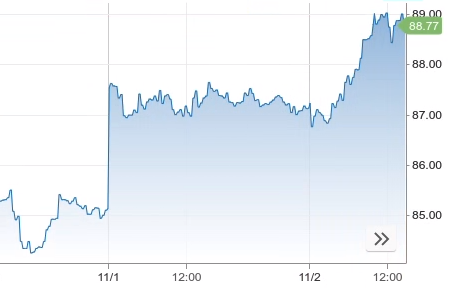The Pentagon has revised its judgment, stating that there is a genuine threat of an assault “soon or within 48 hours” as a result of Tuesday’s WSJ article showing that Saudi Arabia and its ally the United States are on high alert about a potential impending Iranian attack.
On this new “48 hours” intelligence, which the Pentagon purportedly obtained from the Saudis, oil prices increased by more than $2, further depressing tech stocks. Iran then denied, as was fairly expected…
What would Iran say, “oh yeah? You got us. Be on the lookout”? Definitely not. And that doesn’t change the anticipation of an imminent attack.
These newest fears come amid tense relations between Riyadh and Washington following the Saudi-led OPEC+ alliance’s decision to reduce oil output objectives last month, which stoked worries about a rise in gasoline prices in the US.
In 2019, a significant strike in eastern Saudi Arabia, which cut the oil-rich country’s output in half and raised energy prices, was attributed by the US and Saudi Arabia to Iran. Iranian officials denied responsibility for the attack, obviously. However, this new threat of attack by Iran, made oil prices rise this morning by more than 2%, as another attack would put more strain on oil production. Diesel and Oil have been on short supply as of late, and this doesn’t help. The futures prices on oil have risen recently in response to a wide-ranging list of geopolitical factors, but the threat of literal missiles is pretty straightforward in how it would affect production.

All of this comes on the heels of more conflict with Iran. The Biden administration has recently placed penalties on Iranian officials in response to the savage crackdown on protesters that followed the murder of Mahsa Amini, 22, in September after her detention by Iran’s morality police. Mahsa was 22 years old at the time of her death. In addition, the administration imposed sanctions on Iran for providing drones to Russia for use in its conflict in Ukraine.
According to the organization Human Rights Activists in Iran, 14,160 individuals have been detained and at least 288 people have died during the demonstrations within the country itself. Despite the Revolutionary Guard’s stern warnings to Iranians to desist, protests have persisted for weeks now in what seems to echo the Iranian revolution.
In response to these new threats yesterday and today, the Biden administration reaffirmed that it will not hesitate to respond… “We are concerned about the threat picture, and we remain in constant contact through military and intelligence channels with the Saudis,” the National Security Council said in a statement. “We will not hesitate to act in the defense of our interests and partners in the region.”
Brig. Gen. Pat Ryder, the Pentagon’s press secretary, said in new statements to the AP, “We’re in regular contact with our Saudi partners, in terms of what information they may have to provide on that front…but what we’ve said before, and I’ll repeat it, is that we will reserve the right to protect and defend ourselves no matter where our forces are serving, whether in Iraq or elsewhere”
But this isn’t the only supporting factor to crude and nat-gas. The news that American officials are reducing their intention to control Russian oil prices and raising the intended cap price is helping to support the price of oil. With this proposal, the United States hopes to deprive Russia of the oil revenue that it uses to pay for its invasion of Ukraine. According to reports, only the G-7 and a small number of other nations have indicated that they will take part in the proposal. Turkey, China, and India have all said they won’t take part, which would seriously undermine the idea. On December 5, European restrictions prohibiting the import of Russian crude oil into Europe via sea will take effect.
There is also speculation that China may relax its Covid Zero policy, which affects crude prices and production demand. Unverified social media reports from the previous day claimed that the Chinese government was thinking about reducing the restrictions of its citizens, and shortening the quarantine period for incoming passengers.
This may be in an effort to increase tourism. Air travel in China during the Golden Week holiday in the first week of October was down -42% from a year earlier, and road trips by Chinese tourists during the week-long holiday were down about -30% from a year ago. Transportation accounts for about half of oil consumption in China.

